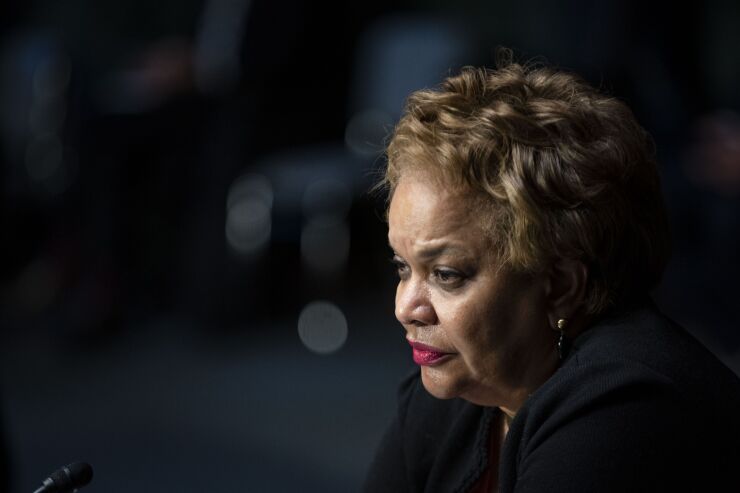
Federal Housing Finance Agency Director Sandra Thompson said it's not enough for
Speaking at an event hosted by the Bipartisan Policy Center in Washington on Monday, Thompson said the banks need to do more to assess the financial states of their member financial institutions before
"You can't just have collateral-based lending," she said. "You've got to take a look at the financial condition of the member, because if the bank fails … those losses get absorbed by other banks and it's a bigger ecosystem. The Home Loan banks say they've never had a loss, but when a loss takes place … all will pay, we pay, the public pays."
The remarks were Thompson's first public comments since her agency published its
During the event, Thompson cited key findings of the report, including that many banks that are eligible to take advances from the system have not taken the proper steps to ensure they are also positioned to borrow from the Federal Reserve's discount window, a reality that makes the Home Loan banks de facto lenders of last resort — a role, she said, they were never meant to fill.
Specifically, Thompson noted the importance of having contracts in place to allow assets to be moved from a Home Loan bank to the Fed in a pinch. During the failures of Silicon Valley Bank and Signature Bank earlier this year, both institutions struggled to pledge collateral to the discount window in a timely manner. Though it is unclear whether a smoother experience with the Fed's last-resort lending facility would have staved off failure for either of the banks, officials have said the episode should serve as a wake-up call for all banks.
"We have been working with the Home Loan banks and the Federal Reserve banks to ensure that members have these lines that they can tap, that they understand what their credit limits are, that they understand how the Fed's processes work, and that they're testing these processes before they need them, not in the event of a crisis," Thompson said.
A former head of supervision at the Federal Deposit Insurance Corp., Thompson noted that Home Loan Bank System advances are imbued with so-called "super lien" priority, a feature that protects the system from losses but can also result in greater losses to the Deposit Insurance Fund. Likewise, the system's mandatory prepayment fee — a penalty for borrowers that pay off advances ahead of schedule —- remains active even in the case of failure, potentially increasing the cost to the DIF further.
To avoid this, Thompson said, the FHFA is pushing for greater collaboration among the Home Loan banks, their members and their members' primary regulators.
"There just needs to be a lot of coordination and collaboration between all interested parties so that we can make informed decisions," Thompson said. "It can't just be the Home Loan bank and the member, especially for a troubled institution. You have to have conversation with the primary federal regulator who has updated information on the financial condition of that institution."

Regulators can prohibit Home Loan banks from issuing advances to banks with capital deficiencies. Home Loan banks also have the ability to deny advances to members believed to be unsound.
After the release of the report, which also calls for a higher degree of communication among the Home Loan banks, their member banks and regulators, some policy experts questioned the wisdom of offloading too much risk-mitigation responsibility to the regulators, noting that confidentiality requirements bar agencies from sharing certain information about the institutions they supervise. But Thompson said these restrictions would not be impediments to the collaborative regime she envisions.
"We have a really good relationship with the primary federal regulators, the [National Credit Union Administration], FDIC, the Fed and the [Office of the Comptroller of the Currency]. We talk to them regularly, and we really talk to them when there is an issue with a bank or another financial institution," Thompson said. "When there's a crisis, all silos are gone and we work together."
Even in noncrisis moments, Thompson said, the Home Loan banks get regular examination reports on their members from federal bank regulators, though often that information is lagging. Still, she said, even the best information from the agencies is not a substitute for quality underwriting by the Home Loan banks.
"They're supposed to do due diligence on their members, especially when they're making advances," Thompson said. "Just because they've got the collateral, you've got the prepayment penalties, you've got the priority lien, that does not divorce … the Home Loan Banks from making sure that they are doing a financial assessment of those members. Period. That's what they're supposed to do."
During the event, Thompson reiterated several policy actions called for by the report, including a doubling of the affordable housing requirements for the Home Loan banks and allowing more institutions to become members of the system — both of which would require congressional approval.
Given the various advantages the Home Loan banks enjoy, Thompson said it is not unreasonable to expect them to play a greater role in addressing the nation's housing issues. Noting that the banks are exempt from paying state and federal taxes, and also benefit from an "implied guarantee" from the federal government, she said it is reasonable to double the share of their income they are required to set aside for affordable housing from 10% to 20%.
"People will say that they're private corporations, but these are government-sponsored entities, and they have a public purpose," she said. "We are in a huge housing crisis right now. From the supply side and affordability, there's a lot that they can do. And we've done our numbers and we think they can easily handle 20%. Will everybody like it? Probably not. But is it the right thing to do? I believe so, as long as it's done in a safe and sound manner."




